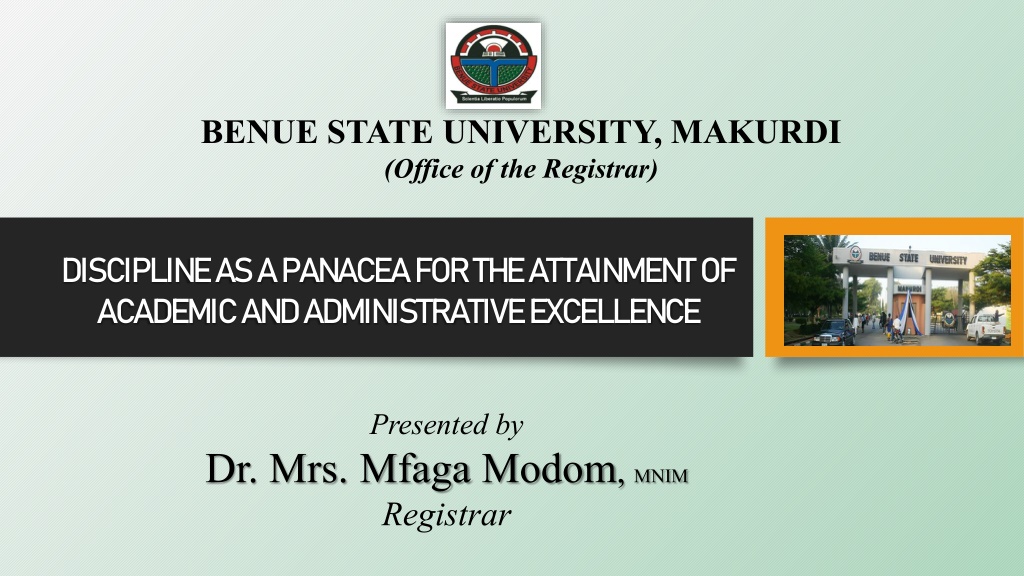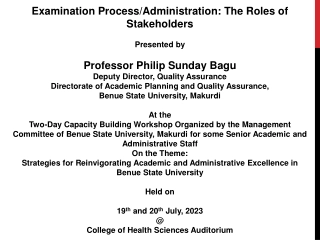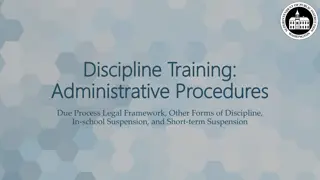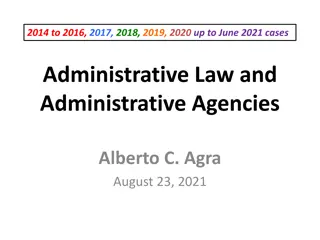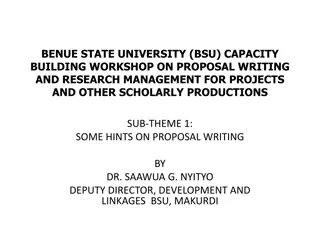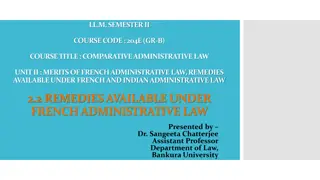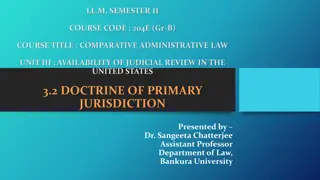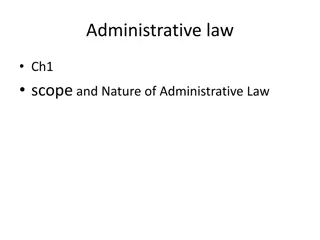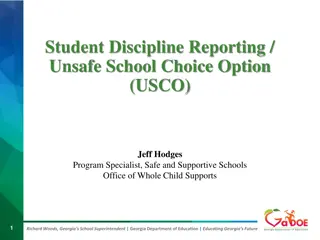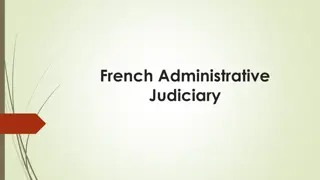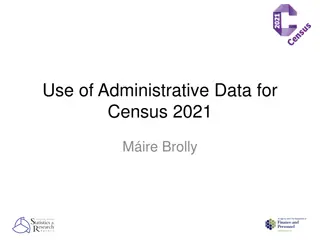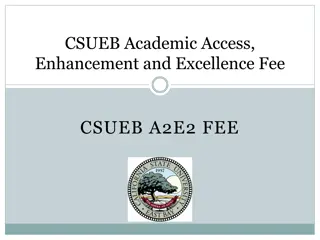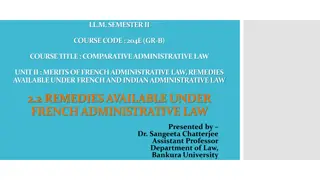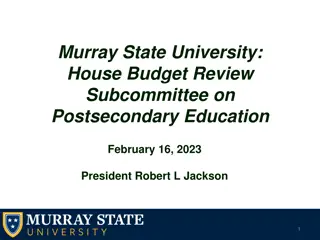Discipline for Academic and Administrative Excellence at Benue State University, Makurdi
Every organization, including Benue State University, has regulations to ensure optimal performance. This paper discusses the importance of discipline in staff conduct for effective university administration. The university's mission focuses on excellence in knowledge creation and developing individuals capable of driving change. Core values emphasize integrity, accountability, and using education for liberation.
Download Presentation

Please find below an Image/Link to download the presentation.
The content on the website is provided AS IS for your information and personal use only. It may not be sold, licensed, or shared on other websites without obtaining consent from the author. Download presentation by click this link. If you encounter any issues during the download, it is possible that the publisher has removed the file from their server.
E N D
Presentation Transcript
BENUE STATE UNIVERSITY, MAKURDI (Office of the Registrar) DISCIPLINE AS A PANACEA FOR THE ATTAINMENT OF ACADEMIC AND ADMINISTRATIVE EXCELLENCE Presented by Dr. Mrs. Mfaga Modom, MNIM Registrar
INTRODUCTION Every organization has laid down rules and regulations for its optimal performance and functioning, Benue State University, Makurdi has regulations governing the conditions of service for senior and junior staff of the University. The provisions of the regulations must be observed as laid down failing which appropriate sanctions are applied. This is predicated on the fact that if there are no rules regulating the conduct of human behaviour, many people will abuse the system thereby creating a state of anarchy.
Similarly, every University has its own rules and regulations on the conduct of staff and students for effective academic performance and administration. This is more so that the conduct of staff affects the administration of the University and its image positively or negatively. It is in view of this that this paper sets out to discuss the conduct and discipline of Benue State University staff for effective University performance and administration.
OUR MISSION To be a Centre of Excellence in creating knowledge and developing a complete person who is capable of not only responding to the cultural, social, political and economic needs of the environment, but also setting the agenda for change.
CORE VALUES The following core values constitute the university s philosophy and therefore shape its policy and strategy: Excellence in research. Placing the latest knowledge at the disposal of students via teaching and skills development. Effective engagement with all relevant communities. To use education as a tool for people s liberation, the University strives to hold itself up as the lamp of the world by upholding moral rectitude, integrity and accountability in all its transactions with its stakeholders.
To use education as a tool for peoples liberation, the University strives to hold itself up as the lamp of the world by upholding moral rectitude, integrity and accountability in all its transactions with its stakeholders.
CODE OF CONDUCT The University takes a positive view on discipline for the following purposes: (i) Maintaining a code of conduct of a standard which enables the University achieve its goals/missions. Correcting faults and inculcating professional qualities in staff. (ii) Consequently, it is necessary to observe the provisions contained in this Rules and Regulations as laid down in the Conditions of Service for Senior Staff; hence breaches of these Rules and Regulations as well as other cases of indiscipline attract appropriate sanctions.
CONDUCT The University in maintaining effective control over the behaviour of the generality of the staff considers the following actions as offensive which may amount to either misconduct or gross misconduct.
Gross Misconduct This means an unacceptable or improper behaviour of a very serious kind, especially by an employee or professional person. Section 1(xxv) defines gross misconduct as any conduct specified by the (Regulations Governing the Conditions of Service for Senior Staff, 2021) University to be gross misconduct, namely: (i) (ii) (iii) (iv) (v) (vi) Absence from duty without justification for 20 working days. Admission racketeering or irregular offer of admission. Concealment of employment history or deceit about academic qualification. Conviction for a criminal offence by a Court of law. Cultism and Gangsterism. Engagement in any other full time gainful employment.
(vii) (viii) Fraud, irregular/illegal alteration of vouchers or other official documents. (ix) Inappropriate registration or graduation of a student or students. (x) Leakage of examination question. (xi) Manipulation of Students records and results. (xii) Plagiarism. (xiii) Sale of Examination Marks. (xiv) Sexual harassment . (xv) Theft. Falsification of academic/professional certificate.
Misconduct In maintaining effective control over the behaviour of the generality of staff, the University considers the following behaviours as misconduct: Absence from duty without justification for 1-10 days. Absence from duty without justification for 11-19 days. Academic sterility. Breach of laid down procedure. Checking out of the University quarters without being duly checked out. Collection of physical cash by staff as departmental levies or unauthorized collection of monies.
Deliberate refusal to answer questions satisfactorily or produce evidence before or as requested by any investigating or fact-finding body established lawfully or legally. Deliberate/unreasonable delay attending to students or staff official work. Dereliction of duty, for example, poor supervision, mismanagement, improper call over, improper performance of duty and inefficiency. Diversion and or conversion of University property to private use. Drunkenness while on duty. Engaging in homosexuality, lesbianism and gay sexual activities.
Extortion of money from staff/students. Failure to attend a conference seminar, workshop or other meeting/event for no justifiable reason for which sponsorship has been received. Failure to comply with the deadline for submission of examination results. Failure to keep or account for official records. Failure to obtain or have a valid driver s licence, where applicable. Failure to obtain professional registration. Failure to resume duty after the expiration of leave.
Failure, upon having knowledge, to make an immediate report of loss or damage of University property to an immediate superior. Falsification of age and state of origin or may other personal records. Fighting, physical attach on another person/deliberate verbal abuse. Habitual lateness to work. Habitual misconduct, example receiving three written warnings. Hawking within the precincts of the Benue State University campus.
Issuing frivolous queries. Making false claims without reasonable grounds against the University or any of its constituent parts. Molestation of staff by Union members during strike action. Negligent loss of University property. Occupation of staff quarters without being duly checked in. Public utterances or publications (in the regular press, public places or social media) which have the effect of embarrassing or tarnishing the good name of, or bringing into ridicule or disrepute, the University, including the Senate and/or the officers of the University. Refusal or failure to properly handover with respect to the office previously occupied.
Refusal to proceed on leave or to a posting or to perform assigned duties or to obey any other lawful order. Sale of handouts, monographs, books and laboratory manual, outside the University bookshop. Shifting of examination timetable without recourse to the authorities. Sterility. Strike action (by staff recognized as projection of Management). Surrogate teaching, surrogate marking of scripts, surrogate administration, and surrogate invigilation. Unauthorized attendance of courses. Unauthorized occupation of staff quarters.
Unauthorized disclosure of official information. Unauthorized expenditure/expenses of University Funds. Unauthorized extraction of/from official document. Unruly behaviour use of foul language. Vandalization of University Library materials and property. Willful loss or damage of University property. Any other act that may bring the name of the University into disrepute.
A misconduct or gross misconduct attracts disciplinary measures. Disciplinary Procedure: (i) Disciplinary Departmental/Faculty Department/Dean/Provost/Director/Coordinator (each of which is hereinafter simply called Head of Department ) A Head of Department shall be responsible to the Vice- Chancellor of the University for the discipline of the staff assigned to his Department in all matters relating to the Department; and consequently, all members of staff shall obey all lawful directives of the Head of Department. The Head of Department shall have power to issue written queries to any staff assigned to his Department in respect of any act of misconduct; and such staff shall reply in writing to such queries within 48 hours. action may ordinarily level be the taken at the of by Head (ii) (iii)
(iv) The Registrar shall be copied all written queries and responses for filing and or further action. If the Head of Department is satisfied with the response, there shall be no need for further action; and in that case, he shall communicate in writing to the staff and the Registrar appropriately. If the Head of Department is not satisfied with the response, he shall write his report to the Registrar who shall, through the Establishment Division, process and forward same to the Vice- Chancellor for further action. If the query emanate from Management or Council, the Head of Department shall not be required to make any comment on the response of the staff. (v) (vi) (vii)
(viii) Upon receiving written communication from the Registrar, the Vice- Chancellor shall direct referral of the disciplinary process to the Senior Staff Disciplinary Committee (SSDC) for further investigation and recommendation to Council: Provided that the SSDC shall strive to conclude each disciplinary case referred to it within six months. (ix) Any staff not satisfied with the outcome of any disciplinary proceeding or action may, if he so desires, appeal to the University Council, which shall deal with it as stipulated in the University Law or the Council s Standing Rules.
(x) Any staff of the University concerned with taking any action stipulated in the provisions of these Regulations on disciplinary procedure, apart from the staff facing the disciplinary action, shall take the prescribed action not more than two weeks from the time disciplinary processes were received by him. Any staff who fails or defaults in making a formal protest against the decision based on the recommendation of the SSDC within six months from the date the decision is communicated to him shall forfeit his right to do so. (xii) All disciplinary processes and proceedings, terminating at whatever level, shall be kept by the Registrar in the affected staff s file. (xi)
Senior Staff Disciplinary Committee Composition of the Senior Staff Disciplinary Committee (SSDC) The SSDC shall be comprised of the following, namely (i) The Chairman of the Council or his nominee (ii) Deputy Vice-Chancellor (Administration) (iii) Two external members of the Council (iv) Two members of Senate to be elected by Senate as alternate members to participate when cases against a academic staff are to be considered. (v) Two members of senior administrative staff to be appointed by the Registrar as alternate members to participate when cases against administrative and Technical staff are to be considered. (vi) The Registrar as Secretary. (vii) In attendance: A Legal Officer of the University.
Powers of the Senior Staff Disciplinary Committee (SSDC) The SSDC shall, in the discharge of its functions, have and exercise the following powers, namely: (i) To investigate, consider and determine all disciplinary cases involving all senior members of staff of the University except the Vice-Chancellor, the Deputy Vice-Chancellors, and other Principal Officers of the University. To make recommendations to the Council on any matter where the punishment prescribed in the Regulations Governing the Conditions of Services is considered insufficient in the circumstance. To adopt its own procedure of proceedings as it deems fit from time to time. (ii) (iii)
(iv) To determine from time to time sanctions to be meted for offences not contained in these Regulations; and any such determination shall be recommended to the Council. To make recommendations to the Council on any matter that will promote proper and appropriate discipline of members of staff of the University. To report to the Council from time to time. (v) (vi)
Types of Disciplinary Measures The Senior Staff Disciplinary Committee (SSDC) shall, depending on the severity of the misconduct shall recommend the following disciplinary measures: (i) Serious reprimand (in writing) (ii) Loss of annual increment for a specified period. (iii) Delay of promotion/appointment for a specified period. (iv) Loss of headship or other administrative position of honour and responsibility for a specified period. (v) Deferment, confirmation and withholding of appointment. (vi) Surcharge. (vii) Withholding of salary.
(viii) Withholding of increment. (ix) Suspension for a specified period without pay. (x) Denial of Sabbatical Leave. (xi) Compulsory retirement. (xii) Forced resignation. (xiii) Termination of appointment. (xiv) Demotion and termination where termination alone is not considered adequate punishment. (xv) Dismissal.
Interdiction (i) Where a staff is under investigation for a criminal offence, whether or not connected with the University; or is facing disciplinary proceedings for gross misconduct that may lead to dismissal, the Registrar may interdict him from his duties forthwith. Formal notice of interdiction shall be given to the staff concerned in writing; and such notice shall state the date of the interdiction and the reasons for such interdiction. (iii) Where a staff has been interdicted, he shall be placed on half salary. (ii)
(iv) A staff who is under interdiction shall be required to hand over all property of the University in his possession to the Head of Department and shall be forbidden from carrying out his duties and visiting his place of work except with the permission of the Registrar. (v) Where a staff under interdiction is found not guilty of all charges, his interdiction shall be lifted and he shall receive the balance of his salary for the whole period of his interdiction. (vi) The period of interdiction shall not exceed six (6) months within which it is expected that the investigation and/or a decision must have been reached on the matter, staff shall be placed on suspension pending the determination of the matter. otherwise the
Suspension (i) A staff who is under investigation for a criminal offence, whether or not connected with the University that last for more than six months shall be placed on suspensions by Management pending the determination of the criminal matter. On the recommendation of SSDC Management may suspend a staff for a specified period of time. When a staff has been suspended, he shall there-upon be forbidden to carry out his duties and shall not visit his place of work without the written consent of the Registrar. He shall surrender account books and records and other property of the University in his charge to such other staff as the Head of Department may direct. (ii) (iii)
(iv) A staff under suspension is not entitled to any emoluments until the suspension is lifted: provided that a staff placed on suspension pending the determination of a criminal matter shall be entitled to retrospective emolument for the period under suspension if discharge and acquitted at the end of the exercise. Procedure after Dismissal of Staff (i) A staff dismissed shall not be entitled to any benefits or emoluments, commencing from the date of the dismissal, except if his dismissal is reversed by the Council or the Court. (ii) Dismissal shall take effect from the date on which the staff concerned is officially notified that he has been dismissed. (iii) Any staff dismissed for gross misconduct shall immediately hand over University property in his possession and vacate the University premises forthwith.
Termination of Appointment by Council for Services Not Required Council may terminate the appointment, employment or service of any staff of the University premises forthwith. Termination (i) A confirmed staff whose appointment is terminated by the University shall be entitled to: a. Gratuity where he has put in up to five years but less than ten years of continuous service in the University. b. Pension where he has put in up to ten or more years of continuous service in the University. (ii) A staff whose appointment is terminated for gross misconduct shall immediately hand over University property in his possession and vacate the University premises forthwith.
Offences and Sanctions S/N 1. Type of Offence Gross Misconduct List of Offences Absence from duty without justification for 20 working days. Admission Racketeering or irregular offer of admission. Sanctions Dismissal Dismissal Concealment of employment history or deceit about academic qualification. Conviction for a criminal offence by a court of law. Cultism and gangsterism Falsification of academic/professional certificate Dismissal Dismissal Dismissal Dismissal Fraud, irregular/illegal alteration of vouchers or other official documents Dismissal Inappropriate registration or graduation of a student or students Dismissal
S/N Type of Offence Gross Misconduct List of Offences Leakage of examination questions. Sanctions Dismissal Manipulation of students records and results. Dismissal plagiarism Dismissal Sale of examination marks Dismissal Sexual harassment Dismissal Theft Dismissal
S/N 2. Type of Offence Misconduct List of Offences Absence from duty without justification for 1-10 days. Sanctions Serious reprimand in writing Absence from duty without justification for 11-19 days Termination Abuse of office Loss of headship or other administrative position and responsibility for specified period. Termination Academic sterility Breach of laid down procedure Serious reprimand in writing Surcharge for damages or loss Checking out of the University quarters without being duly checked out
S/N Type of Offence Misconduct List of Offences Collection of physical cash by staff as departmental levies or unauthorized collection of monies Conversion of staff quarters to a commercial or any other unlawful use Sanctions Termination Revocation and surcharge for any loss or damage Suspension and surcharge for any loss or damage Deliberate refusal to answer questions satisfactorily or produce evidence before or as requested by any investigating or fact-finding body established lawfully or legally. deliberate/unreasonable delay attending to students or staff official work Serious reprimand in writing Dereliction of duty, for example, poor supervision, mismanagement, improper call over, improper performance of duty and inefficiency Termination
S/N Type of Offence Misconduct List of Offences Diversion and or conversion of University property to private use Drunkenness Sanctions Termination Serious reprimand in writing Termination Engagement in homosexuality, lesbianism and gay sexual activities Extortion of money from staff/students Termination Failure to attend a conference, seminar, workshop or other meeting/event for no justifiable reason for which sponsorship has been received Immediate refund of money collected, in addition to serious reprimand in writing Withholding of salary until compliance Failure to comply with the deadline for submission of examination results three (3) weeks after the writing of the last examination paper (see Senate Records on Examination)
S/N Type of Offence Misconduct List of Offences Failure to keep or account for official records Sanctions Termination Failure to obtain or have a valid driver s licence, where applicable Serious reprimand in writing Failure to obtain professional registration Suspension from duty for a period of three (3) months without pay renewable until compliance Serious reprimand in writing Failure to report promptly any misconduct on the part of another staff, after having knowledge of such misconduct Failure to resume duty after the expiration of leave Termination
S/N Type of Offence Misconduct List of Offences Failure, upon having knowledge, to make an immediate report of loss or damage of University property to an immediate superior Sanctions Serious reprimand in writing. Falsification of age and state of origin or any other personal records Fighting, physical attack on another person/deliberate verbal abuse Termination termination Habitual lateness to work Serious reprimand in writing Termination Habitual misconduct, example receiving three writing warnings Hawking within the precincts of the Benue State University Campus Suspension for one (1) month without pay.
S/N Type of Offence Misconduct List of Offences Issuing frivolous queries Sanctions Reprimand Making false claims without reasonable grounds against the University or any of its constituent parts Molestation of staff by Union members during strike action Termination Termination Negligence loss of University property Termination Occupation of staff quarters without being duly checked in Suspension for three (3) months without pay and eviction
S/N Type of Offence Misconduct List of Offences Public utterances or publications (in the regular press, public places or social media) which have the effect of embarrassing or tarnishing the good name of, or bringing into ridicule or disrepute, the University, including the Senate, Council and/or the officers of the University Refusal or failure to properly handover with respect to the office previously occupied Sanctions Retraction in addition to serious reprimand, suspension for three (3) months without pay or termination Termination of appointment and any other criminal or civil sanctions as appropriate Demotion Refusal to proceed on leave or to a posting or to perform assigned duties or to obey any other lawful order
S/N Type of Offence List of Offences Sanctions Misconduct Sale of handouts, monographs, books and laboratory manual, outside the University Bookshop Termination after two (2) reprimands in writing Shifting of examination timetable without recourse to the authorities Reprimand in writing Sterility Termination Strike action (by staff recognized as projection of Management) Suspension for a period of three (3) months without pay Termination Surrogate teaching, surrogate marking of scripts, surrogate administration, and surrogate invigilation
S/N Type of Offence List of Offences Sanctions Misconduct Unauthorized attendance of courses Serious reprimand in writing Unauthorized occupation of staff quarters Suspension for a period of three (3) months without pay Unauthorized disclosure of official information Termination Unauthorized expenditure/expenses of University funds Termination Unauthorized extraction of/from official document Termination Unruly behavior or use of foul language Serious reprimand in writing
S/N Type of Offence List of Offences Sanctions Misconduct Vandalization of University Library materials and property Recovery and Termination Wilful loss or damage of University property Termination and Restitution/Surcharge as the case may be Any other act that may bring the name of the University into disrepute Suspension for three (3) months without pay or serious reprimand in writing or termination
Mitigation The Council may without prejudice to the sanctions listed above, use its discretion to mitigate sanctions recommended. Such mitigation may include: (i) (ii) (iii) Compulsory retirement from service. Loss of pay without increment. Suspension, demotion or any other sanctions that the Council may consider reasonable in the circumstances. Right of Appeal (i) Any staff who is aggrieved by the decision of the Council has a right to appeal to the Appeals Committee of the Council.
(ii) The notice of appeal which must be in writing shall be served on the Registrar and Secretary to the Council within 14 days of being informed of the decision. An appeal must state the grounds and any fresh evidence. Any notice of appeal received after 14 days shall not be entertained unless the Registrar and Secretary to the Council in his or her discretion agreed to an extension of time. The Registrar and Secretary to the Council on receipt of notice of appeal must within 3 days notify the Chair of the Council of such notice of appeal, who shall within two (2) working days refer the matter to the Committee. (iii) (iv) (v)
CONCLUSION There is a common adage that ignorance of the law is no excuse. Consequently, to be forewarned is to be forearmed. Having come to new knowledge on the code of conduct of the University, it is expected that staff will abide by the acceptable code of conduct for the attainment of academic and administrative excellence if we must achieve our Vision and Mission.
